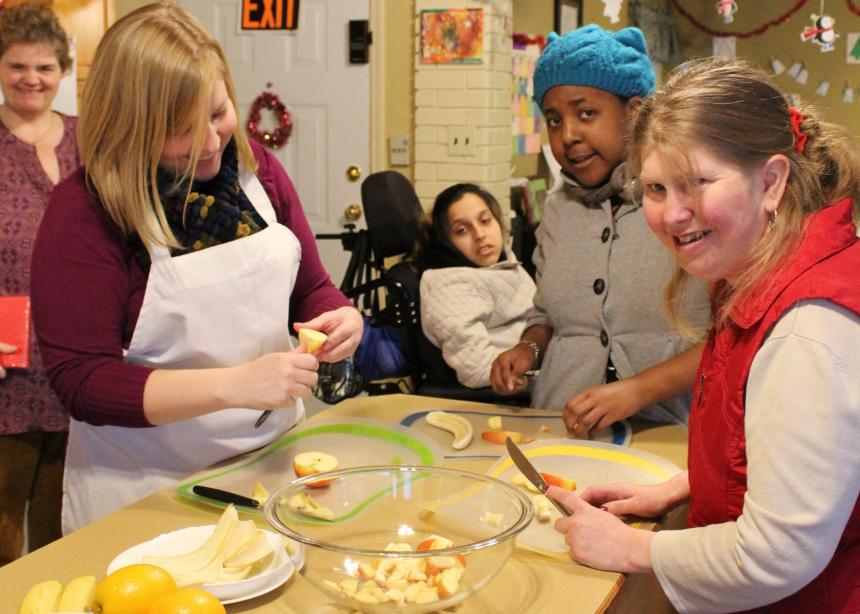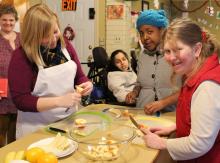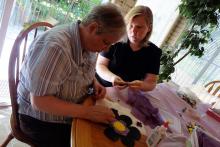It’s a busy morning at Choices and Connections (CAC). They’re preparing brunch and the kitchen smells wonderful: sausages and eggs, pancakes and waffles, syrup and strawberries. Linda and Caroline are helping Nicole cut up the fruit for toppings as Jeevanjot watches. Sue sets the table with special napkins and cutlery. In the den, another group of friends play Wii bowling while others cheer them on.
In many ways, this is a typical day at CAC, one of the longest-running programs of Communitas Supportive Care Society, which has more than 40 years of experience in providing services to people who live with developmental disabilities, with lots of activity, excitement and laughter. This recreation and activity program supports people who live with developmental disabilities.
Nicole Knelsen, a voluntary service worker with Mennonite Central Committee (MCC) who comes from Paraguay, was welcomed earlier at CAC this year. Having graduated with her bachelor of arts degree in theology and education, Knelsen sought an opportunity to either gain work experience or continue her education. She chose MCC’s program and, although her placement at CAC wasn’t exactly what she expected, she has loved the experience so far.
“I have learned so much about myself,” she says.
The biggest lessons have been in communication. She has developed a real passion for improving her communication skills. “There’s that saying, ‘You have two ears and one mouth, so you should listen twice as much as you speak,’” she says. “That’s one of the things I’m really trying to develop, really learning how to listen.”
Knelsen says the participants at CAC are also teaching her about language, especially the language of love. “Love may not be governed by grammar, but it is such a strong way of communicating and people express love so differently,” she says. “Sometimes, when someone says, ‘I love you,’ they’re really saying, ‘I’m sorry.’ Sometimes it’s expressed as an action, with a hug or a smile, which is just as important as words.”
Claudette Iverson, who has managed CAC since 2013, has observed that Knelsen brings grace and patience to her interactions with clients. “She has a calm manner and it transfers to those around her,” Iverson says. “Her teaching experience has also been valuable in preparing class time activities and she is always willing to go above and beyond.”
Another area of learning for Knelsen has been conflict resolution. She appreciates the courage and humility it takes to apologize. The new friends she’s made at CAC have shown her that it’s less about blame and more about starting anew. “I’ve seen it so often here,” Knelsen says. “We have to say, ‘I’m sorry, can we start over?’ This is a habit we need to develop.”
As she accompanies clients on outings or supports them in activities, Knelsen says she’s sometimes moved to tears when she sees someone achieving a goal they have been working on for a long time.
She also loves to laugh and there is not a day that goes by at CAC without laughter. But perhaps the biggest lesson she’s learned has to do with how society views the people she works with. “I don’t like the word ‘disability’ because we all have different abilities,” Knelsen explains. “There are people here who have gifts that I don’t have. When we recognize that we all have abilities and can contribute, it puts us all on the same level. We are equals.”
And for anyone considering work in this field, she highly recommends it. “You won’t regret it,” she says. “This has been life-changing for me.”





Add new comment
Canadian Mennonite invites comments and encourages constructive discussion about our content. Actual full names (first and last) are required. Comments are moderated and may be edited. They will not appear online until approved and will be posted during business hours. Some comments may be reproduced in print.